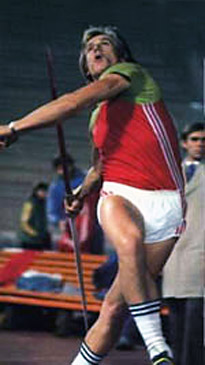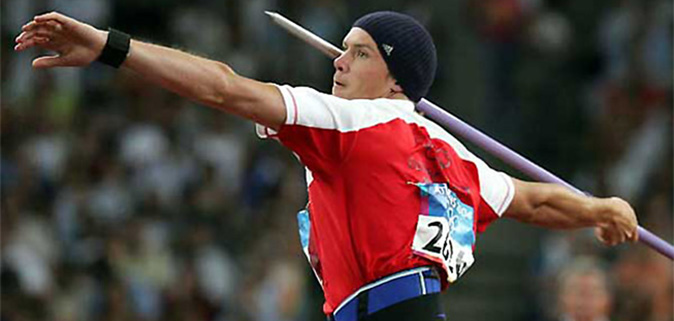Dainis Kūla, Soviet Union (Latvia)

Dainis Kūla (born April 28, 1959 in Tukums) is a former Latvian javelin thrower who represented the Soviet Union at the international level for most of his career. He is most famous for controversially winning the gold medal in men's javelin throw at the 1980 Summer Olympics, becoming the second Latvian to achieve this (after Jānis Lūsis). He is also a World Championship bronze medalist, a three-time Soviet Champion and a two-time Universiade champion.
1980 Summer Olympics
Early in the training season for the 1980 Summer Olympics, Kūla threw 90.30 meters and in the run-up to the Olympics, he threw even farther: 92.06 meters, a mark he would never exceed in an official competition. The favorite though was Hungary's formidable Ferenc Paragi, who had thrown a new world record of 96.72 in April.
At the Olympics in Moscow, Kūla cleared the qualification stage easily but fouled on both of his first two throws in the final. As only the top eight of twelve finalists would be allowed the full six attempts, this meant everything hung on his third throw. Although the third throw flew far, it apparently landed flat and failed to pierce the field, which meant it too should have been ruled illegal. However, in front of the home crowd, the officials raised a white flag indicating that the throw was good; it was measured at 88.88, easily enough to advance him to the last three rounds (indeed taking the lead at that point). On his fourth throw, Kūla threw 91.20 meters, the only mark in the competition to exceed 90 m, giving him the Olympic gold. The silver went to Aleksandr Makarov with a last-round mark of 89.64, giving the Soviet Union both of the top spots, while Wolfgang Hanisch of East Germany took the bronze medal. The pre-competition favorite Paragi had led the qualification with 88.76, but only managed 79.52 during the first three rounds in the final and had to be content with 10th place, missing the last rounds.
With the old javelin design still in use at the time, throws frequently landed flat or ambiguously, resulting in questionable official judgements. Kūla's case has gained particular notoriety as it landed him with an Olympic gold, and also because it could easily be seen as Soviet officials favoring their own athlete. (There were other claims of this occurring in the javelin final, including an allegation that the stadium gates were opened to let helping wind in whenever Soviets were throwing, and that Kūla's important third throw had not only been misjudged but mismeasured as well.) However, none of these controversies resulted in any official protest.
source: Wikipedia







